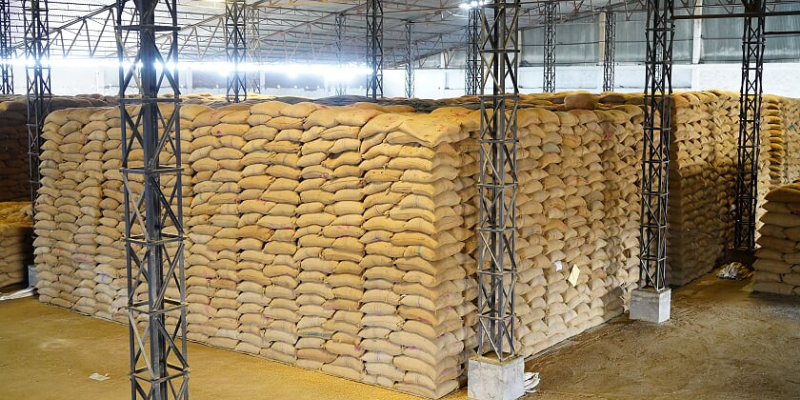While the atmosphere in New Delhi remains charged as agitating farmers, concerned over prices, protest the new agriculture reform laws, Origo Commodities, over the last ten years, has ensured that every participant in this ecosystem gets a fair price for the produce of the land.
In the vast agricultural ecosystem – starting from the farmland to putting the food onto your plate, the two very critical elements in this entire cycle is the supply chain infrastructure and financing.
For the farmers, the top challenges after the harvest are about getting the right storage infrastructure and getting also a fair price. Other players involved in this ecosystem like traders and millers also face similar concerns.
Origo Commodities, the Gurugram-headquartered agritech startup founded in 2010 by IIT Delhi graduate Sunoor Kaul and Mayank Dhanuka, has been focused on these two elements – supply chain and financing, to ensure that farmers get a fair price and others involved in this ecosystem get access to legitimate capital.
Sunoor believes that the entire warehousing and procurement infrastructure is very fragmented in the country, and added that there is inadequate institutional finance available for these players.
“There is no single national player who could weave all this together and provide one common platform for supply chain infrastructure and trade financing,” Sunoor tells YourStory.

Mayank Dhanuka, co-founder, Origo Commodities
Supply chain and finance
Origo Commodities realised that supply chain and trade finance is closely intertwined, and one cannot be delinked from the other.
The agritech startup, which received initial funding of $8 million from HNIs based in the US, went about building a supply chain infrastructure where the farmers, traders, millers among many others can store their produce in the warehouse facilities for a nominal fee.
Today, it has a pan-India footprint of more than 500 warehouses across 15 states, and a storage capacity of 3.5 million metric tonnes for a wide range of commodities. Its warehouses are utilised by private players and government agencies alike. It currently has assets under management of around $1.4 billion.
But the most crucial aspect for Origo Commodities is financing.
Sunoor says, “There is no dearth of financing for this sector, but there is a lack of transparency and trust in the system and we want to bring a change.”
Having started with warehousing services and later, moving into procurement activity, Origo Commodities expanded its network into finance around five years ago as it can bring the suppliers, buyers and financiers onto a single platform. For the farmers or producers, this startup will stock their commodities and given its extensive network, it can also identify the buyers.
As Sunoor says, “For a farmer, his main interest is to sell at the right price and at the right time.”
Role of finance
It is here that Origo Commodities wants to play a key role where it aims to make financing available at every step of the supply chain ecosystem. Sunoor believes there is a strong intent among institutional finance companies to invest in the agriculture sector but were hindered due to its complexity and lack of transparency.
The big concern among the lenders was whether the money to be lent would be used only for agricultural purpose and not directed to any other activity. Sunoor estimates this to be a $100 billion market but only about $4-5 billion as funding comes from institutional players.
Today, Origo Commodities has emerged as the channel to provide credit to the various participants in the agri ecosystem, as it has their database and profile on their system. The startup has access to the credit profile of each borrower and its technology platform provides the score.

A warehouse facility of Origo Commodities
Tech platform
Every time someone buys and sells on Origo’s platform, it is recorded and transacted on a blockchain platform where it also brings the lenders. This ensures that there is transparency regarding the transaction and also where it is being used, thus driving credibility with the smart contract.
The startup has around seven or eight institutional finance players on its platform, which includes the likes of impact funds, financial investors, and food security focused companies among others.
Origo Commodities now provides various kinds of financial instruments for the agriculture market like pass-through certificate, simple term loans, cover bond, non-convertible debentures etc.
At present, the startup enables the financing and trading activity for six commodities – rice, wheat, maize, cotton and two varieties of oilseeds. It plans to add more to the list once it gets a thorough understanding of the market dynamics.
Origo expects to provide trade financing of around Rs 350 crore by the end of this fiscal and expects to reach Rs 800 crore in FY22. It is targeting to reach Rs 5,000 crore in the next four years.
This startup has a presence in 12 states and plans to take it to 15 over the next three years. In 2018, it raised Rs 80 crore in institutional funding from Cooperative Oikocredit and Hivos-Triodos Fund
Sunoor believes the biggest challenge they face in their business is the lack of awareness within the agri ecosystem.
Origo Commodities has been profitable since 2012-13 and it believes that it is just starting out. There are other players in the post-harvest segment of agriculture like Agribazaar, Crofarm, Unnati, but Origo co-founder believes there is no direct competition in terms of providing services from supply chain to finance.
“Our endeavour is to create trust in the platform, where there is transparency and simplicity in the whole trading of agricultural commodities,” says Sunoor.
Edited by Kanishk Singh
Link : https://yourstory.com/2020/12/agritech-startup-trading-commodities-agriculture
Author :- Thimmaya Poojary ( )
December 23, 2020 at 05:45AM
YourStory


